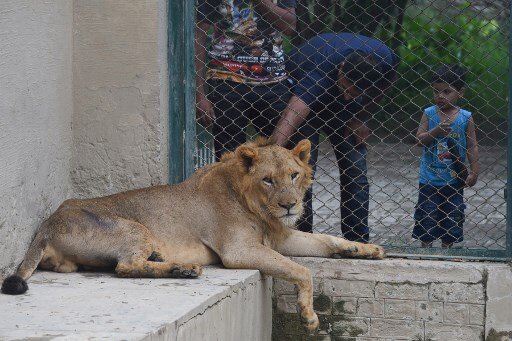As the world celebrates International Lion Day, news has emerged that Pakistan has reversed its controversial plans to auction off 12 lions to private buyers. This comes after the auction, planned from Thursday, drew widespread condemnation from animal rights’ activists including from the World Wildlife Fund. Set over 200 acres, Lahore Safari Zoo is considered one of the best in a country where zoos are known for disregarding animal welfare. The Lahore facility is currently home to 29 lions, six resident tigers and two jaguars. Let’s take a closer look at the entire controversy: Why was the Pakistan zoo getting rid of lions? Money. Or lack of it, to be more specific.
The zoo, like Pakistan itself, is facing an economic cash crunch.
Zoo officials were hoping to raise funds to meet the increasing costs of maintaining animals at the zoo and other expenses as well as clear up some room for the big cats. The maintenance of a lion is not only difficult but also expensive. Lions eat eight to nine kilograms of meat per day. Zoo officials had set a reserve of 150,000 Pakistan rupees ($700) per cat – about the same price as a cow – but hoped each would fetch around two million rupees at auction. Keeping lions, tigers and other exotic wildlife as pets is not uncommon in Pakistan, and is seen as a status symbol. In 2017, Pakistan police arrested businessman Saqlain Javed from his home for taking his pet lioness for a drive through the streets of the bustling port city of Karachi at night. The arrest came after a video showing the same went viral on social media, reported Reuters. He was later released on bail. [caption id=“attachment_11039611” align=“alignnone” width=“640”]  Businessman Saqlain Javed was arrested in 2017 for taking his pet lioness for a drive through the streets of the bustling port city of Karachi at night. Screenshot of the lioness. Youtube[/caption] Wealthy owners post images and video clips of their big cats on social media, and rent them out as props for movies and photoshoots. Mistreatment of animals – in zoos or for entertainment – is commonplace in Pakistan, but attitudes are changing. What did WWF say? The auction planned for Thursday had drawn condemnation from the WWF, which urged authorities at Lahore Safari Zoo to instead rehome them with other government wildlife facilities. “Animal exchanges and donations between zoos are a widely accepted practice,” the organisation’s Uzma Khan was quoted as saying by News18. “Once an institution such as a zoo places a price tag on a wildlife species it is promoting trade — which is counterproductive to conservation,” she added.
This isn’t the first time the WWF has come down hard on Pakistani authorities.
The WWF-Pakistan in 2020 condemned the ill-treatment of a lion at the Islamabad Zoo and “expressed grave concerns over the videos appearing on social media.” [caption id=“attachment_11039601” align=“alignnone” width=“640”]  The World Wide Fund for Nature. Image: WWF[/caption] “It is absolutely abhorrent and unacceptable to treat any animal this way. WWF-Pakistan has expressed its disappointment to the Islamabad Wildlife Management Board (IWMB) and hopes that those who are responsible will be brought to justice for this repulsive act. In the wake of this incident, as a protest, WWF-Pakistan has also stepped down from the Board of the IWMB, of which it has been a member for several years,” the organisation said in its statement. What do zoo authorities say now? The zoo has now said it would create new enclosures for the big cats rather than selling them to private donors. “The main reason behind the auction was the lack of space,” deputy director Tanvir Ahmed Janjua told AFP, adding officials had decided to speed up work building two new enclosures. “Now that this issue is to be resolved soon, there is no need for the auction to take place.”
Janjua denied opposition from animal rights activists had led to the decision to cancel the auction.
“Should the lions breed more, and we see we are running out of space once again, then we can easily hold another auction,” he said. The ill-kept Islamabad Zoo The Islamabad Zoo – once home to what was dubbed the “world’s loneliest elephant” and notorious for housing animals in cramped concrete enclosures – in 2021 launched an ambitious $7.5 million makeover plan. Animal rights activists had campaigned against the plight of Islamabad Zoo’s biggest attraction – a 35-year-old bull named Kaavan, the last remaining Asian elephant in the country – who had lived alone since the death of his mate eight years earlier. Kaavan was transferred to Cambodia in 2020 in a blaze of publicity after his plight caught the attention of US superstar Cher, who helped raise funds for the jumbo relocation. [caption id=“attachment_11039571” align=“alignnone” width=“640”]  Pakistan’s lonely elephant Kaavan arrives in Cambodia by cargo plane to start a new life with 600 fellow pachyderms at a local sanctuary. Reuters[/caption] While the elephant now has hundreds of acres to roam alongside dozens of companions in northern Cambodia, his last years in Pakistan were anything but tranquil. Islamabad Zoo was bereft of any natural vegetation and many animals there developed classic caged behaviour, such as constant swaying or repetitive pacing.
Established in 1978 and eventually growing to 30 acres, keepers struggled to care for the zoo’s residents.
Conditions were so bad that a High Court judge had ordered it closed, and every animal to be relocated – an exercise in itself that ended in tragedy. Two lions died during their relocation when zookeepers attempted to pry them from their pen by setting ablaze piles of hay. With inputs from agencies Read all the Latest News , Trending News , Cricket News , Bollywood News , India News and Entertainment News here. Follow us on Facebook, Twitter and Instagram.


)

)
)
)
)
)
)
)
)



